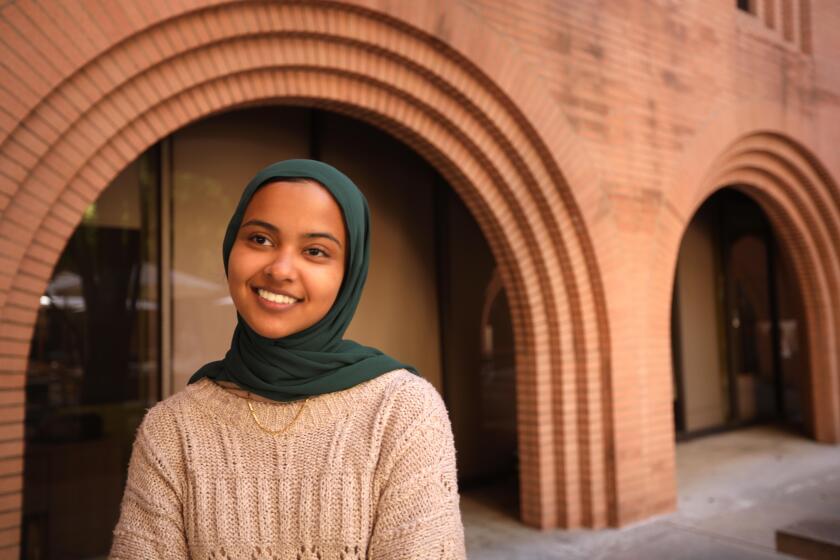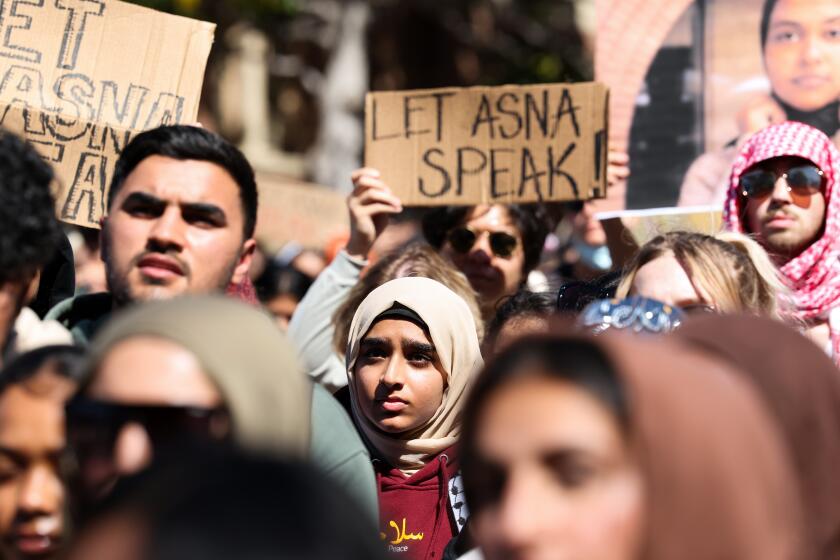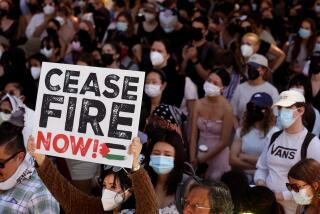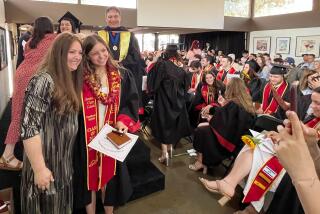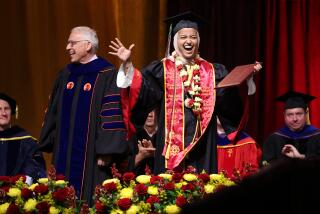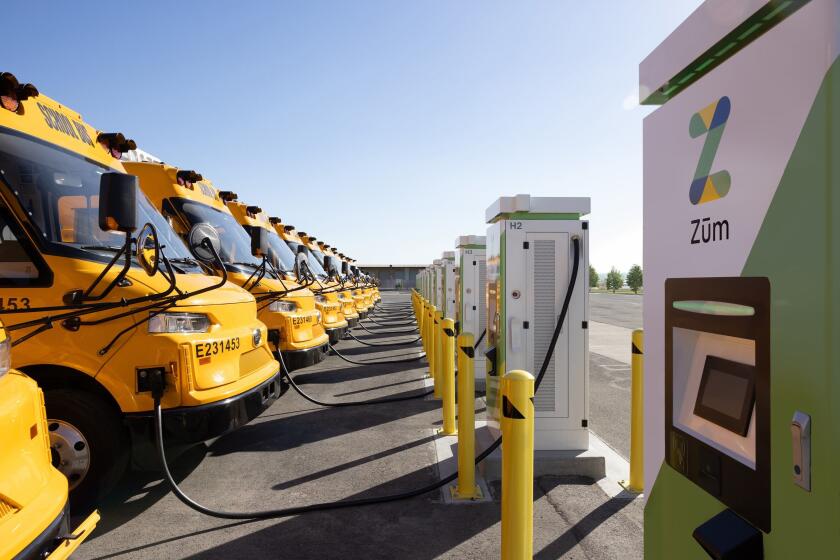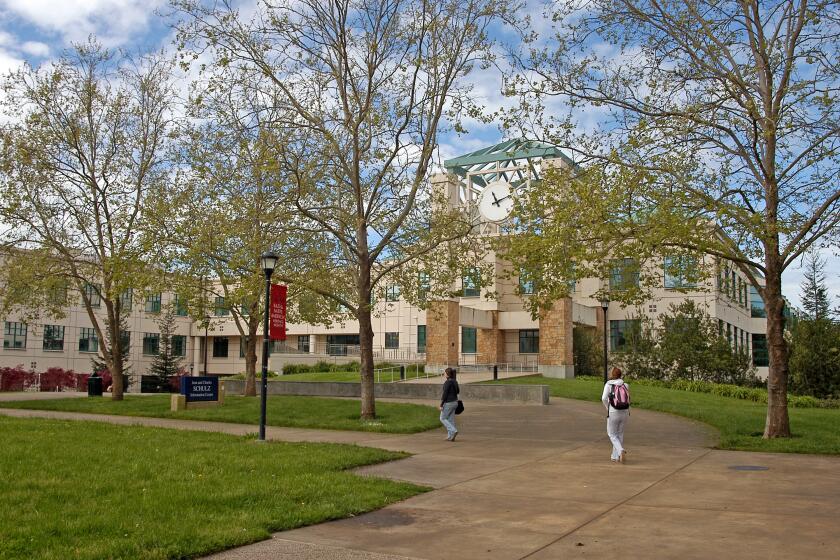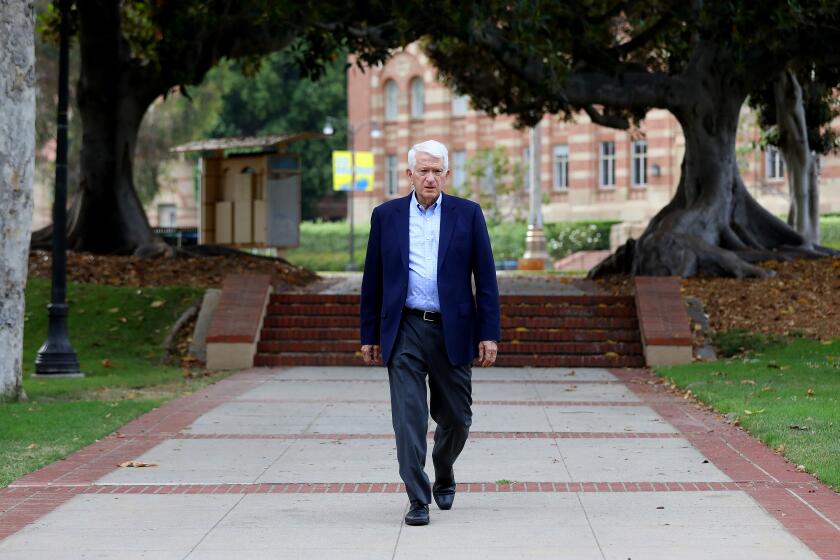Metal detectors, fear, frustration. College commencements altered amid Gaza war protests

The chain link fences are up, bag searches in place and metal detectors installed.
At many universities across the country, graduation for the Class of 2024 will feel more like making it through airport security than a procession through a free-flowing campus green or a cheering stadium crowd.
The drastic changes arrive as universities grapple with pro-Palestinian tent camps — the scenes of recent mass arrests and turmoil — during a volatile time of campus divisions over the Israel-Hamas war. Last week at UCLA a mob attacked an encampment, and violence erupted.
The biggest commencement overhaul is at USC, where the 65,000-attendee “main stage” ceremony was canceled after unspecified threats over the selection of a pro-Palestinian valedictorian who critics said was antisemitic.
Early Sunday morning, police in riot gear cleared an encampment where protesters were pushing for divestment from Israel. It was set up near the site of where the stage would have been and reemerged after Los Angeles police arrested 93 people there on April 24.
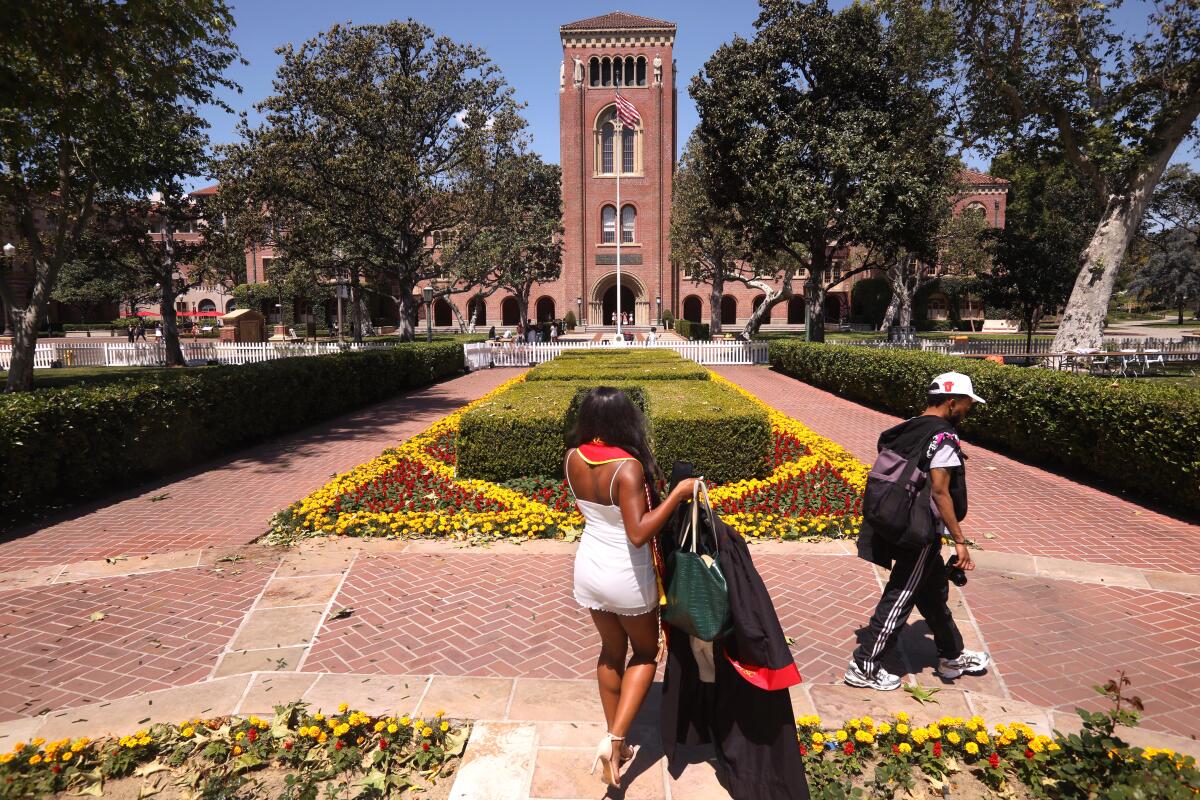
Graduating USC students are capped at getting eight tickets — often fewer for satellite commencements — and administrators are scrambling to entice angry parents with new attractions as the university moves around traditional celebrations.
“We had planned to bring up to 25 people,” said Annette Ricchiazzi, a USC alumna whose daughter graduates this month with an undergraduate degree in theater. The closest family members will attend a ceremony at the Bing Theater, where tickets per student are always limited to four. But grandparents and other relatives had hoped to join the main stage ceremony and other events.
A cascade of decisions that Folt made this spring around USC’s commencement and Israel-Hamas war-related protests inflamed tensions and opened wounds, presenting the most significant test of her tenure.
“Not anymore,” Ricchiazzi said. “And with all the security now up, am I supposed to try to get my mother and mother-in-law in wheelchairs to come and just hang around outside where nothing is happening that involves their granddaughter?” Only Ricchiazzi, her husband and their two other children will attend the Wednesday theater commencement.
USC has also instituted a “clear bag” rule and will run guests through metal detectors as they enter the typically open campus gates. Aiming to offset the disappointment, the university has cobbled together a new “Trojan Family” event that will take place Thursday evening in the Los Angeles Memorial Coliseum. It promises a marching band, fireworks and a drone show.
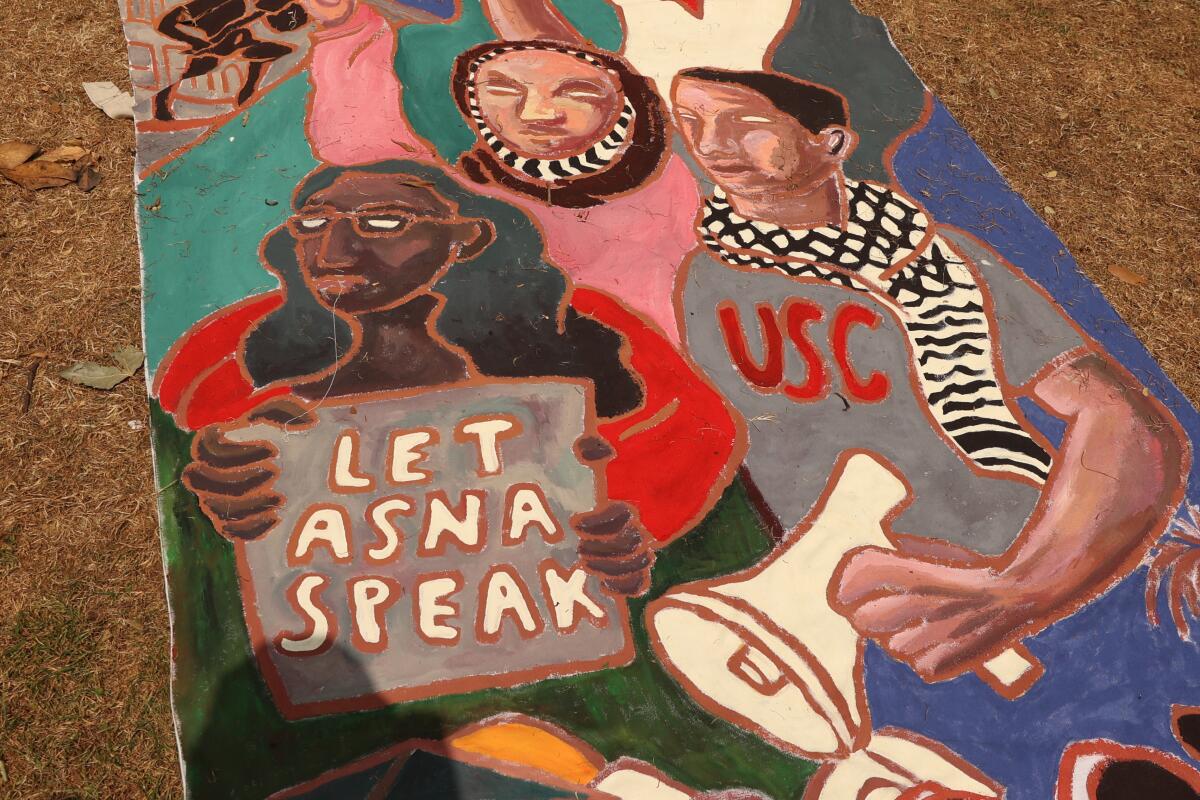
A nondenominational, interfaith baccalaureate was scheduled for that night in Bovard Auditorium — near the site of the former encampment. On Sunday, a USC spokesman said the event was canceled.
“Due to the recent changes in our commencement exercises, we will not host our annual baccalaureate ceremony in its traditional format. Instead, we will offer an online interfaith blessing for our graduating students and their families,” said Joel Curran, USC’s senior vice president for communications.
Faith-specific commencement events, including a gathering for Catholic students and a new May 10 commemoration for Jewish graduates organized by the USC Hillel and Chabad centers, are also planned.
In total, USC expects to dole out more than 18,000 degrees May 8-11 in dozens of commencement events.
How USC’s controversial decision on Asna Tabassum’s valedictorian speech led to nearly two weeks of campus tension with 93 arrests and a canceled ‘main stage’ commencement.
The outcome of USC’s graduation, one of the earliest in the state, could set the stage for end-of-year celebrations nationwide. In Los Angeles, another large commencement will unfold June 14 at UCLA, where law enforcement arrested more than 200 people last week after entering a pro-Palestinian encampment. UCLA has not announced changes to its three identical graduation ceremonies in Pauley Pavilion.
Cal Poly Humboldt, where police last week arrested dozens of pro-Palestinian protesters who had barricaded themselves in campus buildings, announced Friday that it will hold three off-campus graduations at venues that include a casino and a high school — instead of one large ceremony at the Redwood Bowl stadium.
“I know it’s just a ceremony, but it’s tradition and I’m disappointed that I cannot graduate in the same place where my father did,” said Ruby Cayenne, a Cal Poly Humboldt senior who will receive a degree in journalism. “For a while, we weren’t sure if we’d have any graduation at all.”
At UC Berkeley, where commencement is May 14, no changes have been announced. There is an encampment of more than 100 tents at the school. The administration has maintained a hands-off approach to the protest.
Across the nation, similar frustrations and debates over graduation are playing out as protesting students argue that their movement to end the Israel’s war in Gaza, which local authorities say has killed 34,000 Palestinians and the United Nations says has left millions in food scarcity, should take precedence over commencement business as usual. Israel’s retaliatory war began after the Oct. 7 Hamas attack, which killed roughly 1,200 people in the country and took 240 hostage, many of whom are believed to be held in Gaza.
At Columbia University, where more than 100 protesters were arrested last week, the New York Police Department plans to remain on campus through May 17, two days past the university’s commencement.
Minouche Shafik, the Columbia University president, has said she does not want to “deprive thousands of students and their families and friends of a graduation celebration.”
Asna Tabassum was selected as USC valedictorian and offered a slot to speak at graduation. The university canceled her speech after pro-Israel groups criticized her Instagram.
“Many in this graduating class did not get a celebration when graduating from high school because of the pandemic,” she said in recent remarks.
A pro-Palestinian camp is also set up at the University of Michigan in Ann Arbor, where more than 8,000 students attended a Saturday graduation at Michigan Stadium. The university said in a statement that “commencement ceremonies have been the site of free expression and peaceful protest for decades.” At the same time, security procedures similar to those at football game were in place. There were boos as well as cheers as people unfurled Palestinian flags during the event.
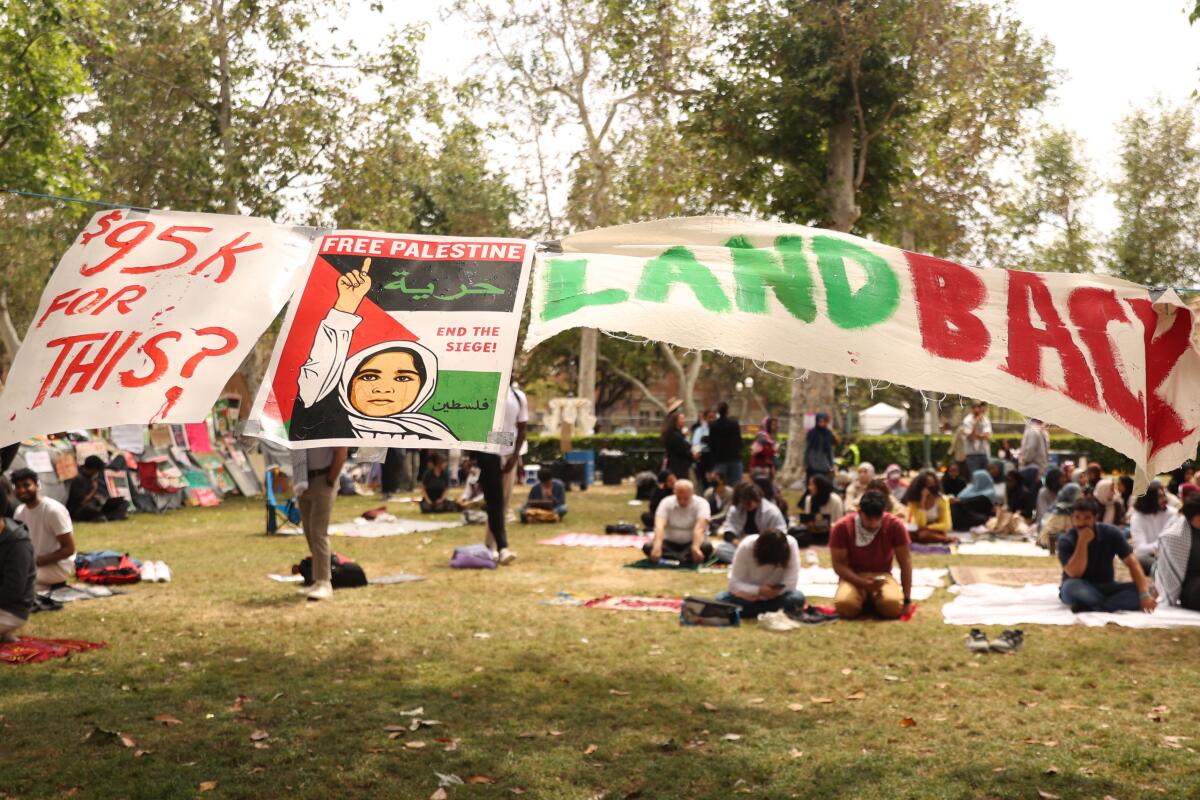
At USC on Friday, about 40 tents and dozens of people, the majority of them students, were present in Alumni Park, the center of campus. Posted signs demanded the university to divest from companies tied to the Israel-Hamas war — a request the university has not accepted.
Students entering campus must go through one of two entrances, show their student ID and have their bags searched. Fencing directs students to security checkpoints. The university also announced Friday that it paused a visitor registration system that allowed students to bring in guests.
As demonstrators studied for finals and held teach-ins in the encampment, students nearby who weren’t activists took photos in graduation regalia by the Tommy Trojan statue and other scenic spots.
Others, such as Sammie Sorsby-Jones, avoided the area.
Sorsby-Jones, a 22-year-old senior majoring in law, history and culture with a minor in gender studies, said that campus felt “apocalyptic.”
“I can’t take walks around campus and reflect on the different memories I have in each building when there’s lines to get into campus and the buildings are surrounded by fences,” she said.
Sorsby-Jones chose not to take graduation photos at landmarks directly next to the encampment.
“It’s not the protesters’ fault, and I know people can still take grad photos there, but it just feels strange,” she said. “It’s this constant reminder of a deeply not normal graduation in a way that does make it difficult to celebrate yourself, because the end of my college experience just feels like it pales in comparison to everything that’s going on right now.”
Speaking to a reporter before the camp was cleared on Sunday, a spokesperson for student activists said, “No matter how this occupation goes down, it’s still a win for us because we have caused a disruption and discomfort to the USC administration. We have ended business as usual for the past few weeks.”
Early Sunday morning on Instagram, camp members said, “We will be back. Free Palestine.”
In an interview Monday, USC President Carol Folt would not commit to avoiding further arrests and did not indicate whether she planned to call for the removal the tents before graduation.
Two USC commencement speakers are boycotting their speaking engagements to protest the university’s cancellation of a valedictorian’s graduation speech.
“My intent is this: to try to come to a resolution that is peaceful.... But we have a lot of students that want to graduate, and I fully expect them to be able to go through that,” Folt said.
In a campus letter released Friday, Folt suggested that she would not let the tents stay much longer.
Nobody is “entitled to obstruct the normal functions of our university, including commencement. ... Every part of our campuses, including Alumni Park, must be fully accessible and free from vandalism and harassment,” she wrote.
In an interview the same day, Aro Velmet, an associate professor of history who has joined students at the camp and was among faculty arrested last week, said he felt the protest was not disruptive to graduation but instead aligned with the university’s purpose.
“Yesterday, during the loudest part of the camp people were chanting and singing union songs and others were taking pictures outside. They were fine. They were not bothered. I wish they had been curious about what’s going on, but they certainly were not disrupted,” Velmet said.
He said the response by Folt’s administration, including the arrests, has been “incredibly disruptive to the core academic mission of the university, which is to produce new knowledge. These are students who are curious about the world, putting their teachings into action.”
More to Read
Start your day right
Sign up for Essential California for news, features and recommendations from the L.A. Times and beyond in your inbox six days a week.
You may occasionally receive promotional content from the Los Angeles Times.


